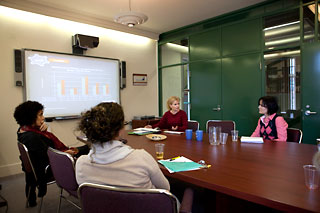Literacy tool great success in Australia
Only 40 per cent of indigenous Grade 3 students in Australia’s Northern Territory achieve the country’s national minimum standard for literacy.
Concordia’s Centre for the Study of Learning and Performance (CSLP) may have a part in improving that situation.

For three years, researchers at Charles Darwin University in Australia have been evaluating the effectiveness of using the CSLP’s software ABRACADABRA in Grade 1 classrooms in the region with positive results.
“They recorded significant gains in a number of literacy subskills in students using ABRA,” reports Anne Wade, CSLP Manager and Information Specialist. The Australian lead researchers on the project, Helen Harper and Janet Helmer, were in Montreal on April 14 and 15 sharing their results. They also had the opportunity to visit schools around Montreal where ABRA is being used.

The Australian research project had its beginnings four years ago at a conference where Tess Lea, director of the School for Social and Policy Research at Charles Darwin University, met with researchers from the CSLP. Given the challenges of teaching literacy in the Northern Territory where there are high levels of student absenteeism and teacher turnover, Lea saw the potential of a tool like ABRACADABRA, which teaches early literacy skills through engaging game-like activities, and could provide continuity in such an unstable learning environment.
The final year of the project, funded by the Telstra Foundation, the Australian Research Council and others, involved a randomized controlled trial with over 300 students. The results are so encouraging that Wade, Harper, Helmer, and CSLP director Phil Abrami met with Melissa Fransen, First Secretary of the Australian High Commission in Ottawa to discuss extending funding for the project.
The CSLP is hosting a conference at Concordia May 18 to 20 for educators interested in their full Learning Toolkit software package (including ABRACADABRA).
Related links:
• May Learning Toolkit conference
• Concordia’s Centre for the Study of Learning and Performance
• “Visitors from Australia” - Mrs. Lynch’s Classroom Blog, April 18, 2011